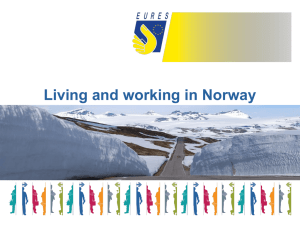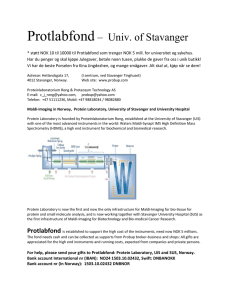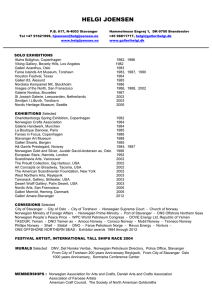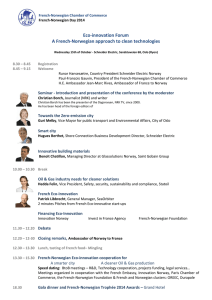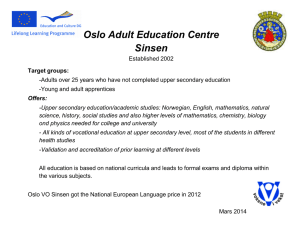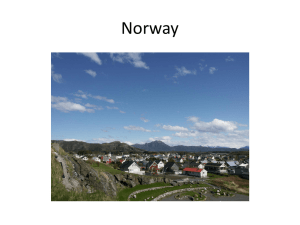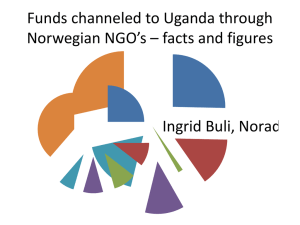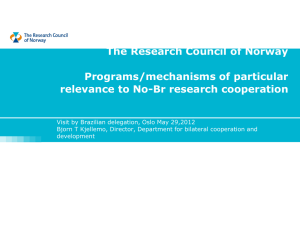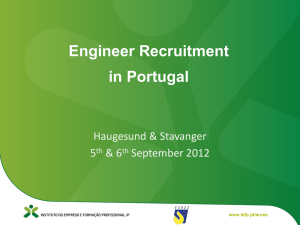A1_30_1700_Norway_LW
advertisement
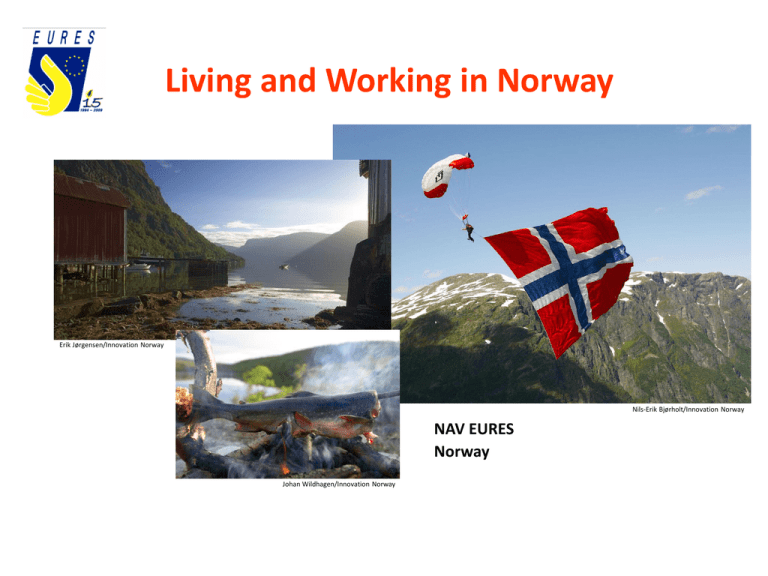
Living and Working in Norway Erik Jørgensen/Innovation Norway Nils-Erik Bjørholt/Innovation Norway NAV EURES Norway Johan Wildhagen/Innovation Norway NAV EURES • Labour and Welfare Administration - Job Centre - National Insurance - Welfare office • EURopean Employment Services - Advisors in 31 countries - Job market and job search - Living and working - Recruitment assistance • www.nav.no • www.eures.no/english Norway • • • • Currency Norwegian kroner, NOK Constitutional monarchy, King Harald V Prime Minister Ms Erna Solberg Conservative government € 1 = NOK 8,20 Characteristics • -30° to +30°C • Bright summers/Midnight Sun • Dark winters/Polar Night – Northern Lights (aurora borealis) • Natural variety • Outdoor culture • High standard of living • Extensive welfare system • Safe working conditions Geography • Population 5,063,709 (Jan. 2013) • 600,922 immigrants (12,2%) – (Poland, Lithuania, Pakistan, Sweden, Irak, Somalia, Denmark and Germany) • 19 counties Trondheim 180,280 • Capital Oslo – 626,953 inhabitants Bergen 270,351 • Biggest cities: Stavanger 129,191 Kristiansand 84,476 Norway • Length 1750 km • 432 km at the widest, 6 km at the narrowest • 25,148 kms of coastline • 7th largest in Europe • 16 persons per km2 Language • Two official forms: – Standard Norwegian (bokmål) – New Norwegian (nynorsk) • Regional dialects • Close to Swedish and Danish • Norwegians speak English well • Most employers require Norwegian or a Scandinavian language • Norwegian courses held in most towns • Free language courses not offered, but is not expensive • Several online courses in Norwegian is offered ”How to understand a Norwegian” • Flat structure – Who is the boss? • Conformity/Equality/No special treatment • Enjoying space, keeping distance, privacy • Not the most impulsive ones – need time • Cold lunches • ”Rude”? • Dress code Labour Market Statistics • Unemployment: 2.6% (October -13); 73,100 persons (lowest in Rogaland with 1,9% and highest in Oslo and Finnmark with 3,4%) • In October 14, 233 vacancies were advertised • Another 15,000-20,000 jobs not advertised • There is still a need for workforce in several sectors, but the need is less urgent than before. SURPLUSES • Norway has a surplus of: – Economists, marketing – Architects – Office staff – Unskilled workers SHORTGES • Companies and institutions need: – Engineers (especially mechanical, structural, electro, automation, hydraulic, piping engineers) – Pre-school educators – Teachers (especially in science subjects and maths) – Nurses (great demand) – Medical doctors – Clinical psychologists – Pharmasists – Bus drivers (in certain regions), taxi drivers – Hair dressers – Cooks and waiters COMPANIES NEEDING ENGINEERS • www.oilcareers.com • http://offshore.no/international/ • www.petro.no • Aker Solutions (akersolutions.com) • FMC Technologies (fmctechnologies.com) • Statoil (www.statoil.com) • National Oilwell Varco (www.nov.com) • Kværner (www.kvaerner.com) • Kongsberg Gruppen (www.kongsberg.com) • Aibel (www.aibel.com) • Fabricom (www.fabricom.no) • Subsea7 (www.subsea7.com) • www.nodeproject.no (business cluster – 57 companies) • Roxar (www.roxar.no) Most needed engineers • • • • • • • • • Petrolium engineers Subsea engineers Drilling engineers Piping engineers Mechanical engineers Hydraulic engineers Naval Architects Structural engineers Machine design engineers No demand for environmental engineers and chemical engineers • • • • Electrical engineers Stress analysts Steel calculation Electronic and computer engineers • Instrument engineers • Automation engineers • Mechatronics/robotics Less demand for civil engineers with no experience with steel structures Working Conditions • Written contract • 6 months probationary period • Salary paid once a month • Employer draws tax from your monthly pay • 37,5 working hours per week • Shift workers have 35,5 hours working week. • Maximum 40 hours per week. Working Conditions • Holiday: 25 working days per year • 30 days for employees over the age of 60 • Holiday pay normally paid out in the month of June • Holiday pay 12% of gross pay for trade union members • 10,2% for non trade union members. • Holiday pay is accumulated • The working environment act. www.arbeidstilsynet.no (available in English) Taxes • If you work in Norway for a Norwegian employer, you pay income tax to Norway • Average income tax is 28% (24.5%) • The National Insurance contribution is 7.8%. • Deductions! • EU citizens are entitled to a deduction called “standardfradrag” in the two first years (10% or max NOK 40,000 per year) • House mortgage or debts etc. increase your deductions • Tax return form submitted every year in April National Insurance I • What is covered through the National Insurance? • Sickness Benefit • 100% pay first year • 66% second year if still in active treatment • Unemployment Benefit • About 63% of pay for a maximum of 2 years • Child birth benefit • 12 months with 80% pay or 10 months, 100% pay • Paternity leave 14 weeks National Insurance II • What is covered through the National Insurance? • Old-age pension • Retirement age in Norway is 67 years • Disability benefit • Free hospital treatment • Free dental treatment for under-18s • Free of charge schools and universities National Insurance III • What is covered through the National Insurance? • Child benefit • Ages 0 to 18: NOK 970 (€120) per month • Single-parent benefits • Cash benefit “Kontantstøtte” • Ages 1 to 2 years: – From 13 months to 18 months, NOK 5000 per month (617 euro) – From 19 months to 23 months, NOK 3303 per month (408 euro) • You have to apply for these benefits at NAV. COSTS • Food (except meat) and cloths are not so expensive. • Alcohol and cigarettes are very expensive. • Eating out in a restaurant is also expensive. • One beer will cost about 8,50 euro and a glass of wine will cost about 10 euro in a pub/restaurant. One coffee will cost about 3 euro • Cars are very expensive. • Petrol is also expensive, despite the fact that Norway is an oil producing country. The prices will vary from day to day. On average it costs about 1,85 euro per liter. • It is expensive to visit Norway as a tourist. What do you get for your wages? • Prices for foodstuffs are on average 62% higher in Norway compared with the average prices in EU-countries. Milk, cheese, eggs and meat are 65% more expensive in Norway compared with the average in Europe. • Fish and other seafood are not so expensive. • 6 hours’ work = 1 week’s supply of food • How Norwegians spend their salary: – housing, electric etc. 27% – public transport, car 20% – food & household goods 18% – culture, leisure 12% • UNDP:Norway highest score for income, duration of life, and living conditions. Average Prices NOK Bread, 750 g 28 Milk, 1l 18 Butter, 250 g 17 Cheese, 1 kg 90 Beer, 0,33 l 19 Coffee, 250 g 20 Potatoes, 1 kg 14 Coca Cola, 1,5 l 23 Beef, 1 kg200 225 Sausage, 1 kg 100 Salmon, 1 kg 85 Fresh Shrimps, 1 kg 129 EUR 3,45 2,20 2,60 11 2,35 2,50 1,70 2,80 27,80 12,35 10,50 16 NOK Big Mac menu, large EUR 90 11 170 21 Cinema ticket 90 11 Newspaper 20 2,45 Magazine 59 7,38 Chocolate, Mars 12,50 1,56 Hair cut, women 450 56,25 Hair cut, men 400 50 CD Bus ticket, Oslo 25 Cigarettes, 1 pack 90 3,13 11 Accommodation - Most Norwegian people own their own house. About 90% of couples living together own their own house/apartment. About 67% of young couples and single parents own their own house/apartment. - The average rent for a house/apartment is NOK 6000 (€ 740) per month. Oslo and Stavanger are more expensive. - You can get your own house with a garden for about NOK 2,000,000 to 3,500,000 (€ 247,000-432,000). Prices vary depending on location and size. Exception Oslo and Stavanger. Homes Homes on the Internet • www.finn.no • www.net.no/boligpriser • www.eiendomsnett.no • www.bolignorge.no • www.meglernett.no • www.bolignett.no • www.zett.no • www.ssb.no (National statistics bureau) Homes Salaries • The average wage in Norway is among the highest in Europe • Average monthly salary NOK 36,700 (€ 4530) • The 10% best paid average NOK 71,400 (€ 8814) per month • The 10% least paid average NOK 20,600(€ 2543) per month • The average salary in the oil and gas sector is NOK 59,700 (7370) per month • No minimum salaries, but collective agreements by sector • Wage negotiations once a year (in April-May) between the trade unions and the Norwegian Employers´Confederation Where to find jobs • • • • • • www.nav.no (Norwegian) www.nav.no/english (jobs posted in English) www.eures.no www.finnjobb.no www.stillinger.no www.indeed.com • NAV Service Centre Phone: +47 800 33 166 – (Mon-Fri 08:00-18:00) • Contact the EURES Adviser in your area Work/Residence permits • Norway is not a member of the European Union, but a member of the European Economic Area (EEA). • All EU/EEA citizens have the right to take up work in Norway • Portuguese citizens do not need a work permit and can begin work the day they arrive in Norway Work/Residence permits • Registration required within 3 months at the local police station , or as soon as you have received a job contract. – This is a formality • You can stay in Norway for 6 months as a jobseeker, but have to register with the police after 3 months. • When you have a jobcontract you must register at https://selfservice.udi.no/, print out and bring it with you to the local police staion or to SUA (www.sua.no). Also bring: – ID-card/passport – A certificate of residence (lease) – Job contract Arriving in Norway • Police (Politiet) www.politi.no • Tax Office/ National Registry www.skatteetaten.no • Bank • NAV www.nav.no Child benefit Family doctor Call centre +47 810 33 810 • SUA (www.sua.no) Service Centre for foreign workers (Oslo and Stavanger) Web sites of interest • www.euresenglish.no Portal - living and working in Norway • www.nav.no Job data base, national insurance • www.udi.no Directorate of Immigration • www.skatteetaten.no Tax office • www.arbeidstilsynet.no Labour Inspection Authority • www.toll.no Customs • www.nokut.no The Norwegian Agency for Quality Assurance in Education • www.sak.no The Norwegian Registration Authority for Health Personnel NORTHERN NORWAY NORWAY - NATURE WINTER IN NORWAY CONTACT CVs and requests can be sent to eures@nav.no (All EURES advisers in Norway will then have access to your CV) ELI SKAUG SYVERTSEN, EURES adviser, Norway eli.skaug.syvertsen@nav.no Sejam bem-vindos! Erik Jørgensen/Innovation Norway

